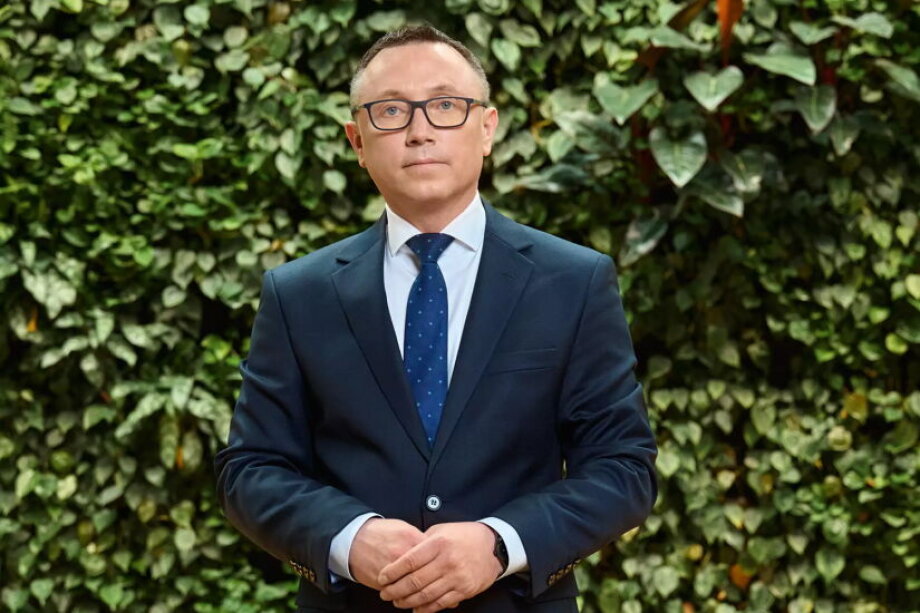WBJ: Let's start with a general question – what are the prospects for the construction industry in the coming years?
Artur Popko: I'm optimistic and see enormous opportunities for the construction industry given the prospects for the development of both the Polish and European economies. We have many infrastructure investments ahead of us, fueled by private and public funds, including EU funds. We expect work to peak around 2030. Therefore, there's still some time for the entire industry to prepare properly, but such a large influx of orders from investors will certainly pose a challenge for the industry.
A new migration policy has been in effect since June 1st, which will limit the inflow of labor to Poland. There's also the risk of Ukrainians returning to the country. Will there be a shortage of workers?
The availability of staff—both management, engineering, and labor—will be a key issue for the industry. We must anticipate an outflow of workers from Ukraine because—I strongly believe—the war will end soon, and a large portion of workers from the East will return home. Furthermore, the process of rebuilding Ukraine will overlap with a wave of investment in Poland, which will also be felt. Budimex currently employs nearly 8,000 people, and for years we have maintained a policy of retaining staff, even if some contracts are expiring. We prefer to secure access to employees precisely for periods of growing order portfolios and decreasing availability of skilled workers. We are not reducing our workforce, and we are increasingly looking for employment opportunities outside of Poland. We are present in the Czech Republic, Slovakia, Germany, and the Baltic countries, and we are very happy to utilize the services of local workers.
Speaking of foreign markets, Budimex is currently implementing contracts in the Baltic countries, the Czech Republic, and Slovakia. What about Western Europe? Does a Polish company have the opportunity to compete in Germany, Spain, France, or Italy?
We maintain our interest in foreign markets, but for now we have no plans to expand beyond the markets where we are already present—the Czech Republic, Slovakia, the Baltic countries, and Germany. These are part of our development strategy for the coming years. Both in the context of strengthening our presence in countries where we already have branches and opening new offices.
A promising market for us is, among others, the Czech Republic, where we have been operating for two years. There, we are building a 7.6-kilometer section of the D35 motorway worth PLN 640 million, as well as the Kutřin polder. In Slovakia, we are nearing the completion of the expansion of the D1 motorway between Bratislava and Triblaviná. After its completion, we plan to participate in tenders for further road contracts. We are also interested in the railway segment.
Germany, for example, is a more closed market, although I would like to emphasize that we have been present there for over 30 years. Today, we have two companies—Budimex Bau and RailBX—and we have already fully completed the bridge investment in Liepe and are implementing another in Oderberg. We have also obtained the necessary authorizations to participate in tenders for railway and traction investments. Currently, we are focusing on this investment market and hope to gradually increase our order portfolio in this market.
We hope that the recognition we will gain as one of the contractors for Rail Baltica will help us gain a broader presence in the Baltic countries. Nearly PLN 5.3 billion is allocated to the Rail Baltica contract in Latvia and Estonia. This represents another step towards expansion and development in foreign markets. We are also monitoring the potential of the Scandinavian markets and developments in Ukraine. We have the expertise and resources to participate in the reconstruction of the local infrastructure after the conflict. Western European countries are very established markets, where it's very difficult for external companies to navigate, and the entry process itself is quite complex and very expensive. Reaching a break-even point often takes 6-10 years. For us, the key will always be the local market, with neighboring markets serving as a primary complement.
Don't you want to try to enter new markets even through acquisition?
We looked for such companies in the German market two years ago, but we currently have no plans to acquire a company operating in Western countries in the foreseeable future.
Your order portfolio is PLN 17 billion. Are you concerned that at some point you won't have the capacity to fulfill all your contracts?
Budimex has been looking ahead to the market for years, which allows us to consciously plan investments, rationally purchase equipment, and manage human capital responsibly. Our contracts, currently numbering approximately 220, are spread over a reasonable timeframe. Previously, we mainly implemented two- to three-year contracts; today four- to five-year projects dominate, and some—like in Latvia—even eight-year projects. This allows us to allocate resources appropriately and ensure that all investments can be completed on time. Construction contracts for nuclear power plant projects and the defense sector are a novelty in Poland.
Construction contracts for nuclear power plant projects and the defense sector are a new development in Poland. Will Budimex be heavily involved in these projects?
Of course. We are investing heavily in the energy sector, both in transmission networks and nuclear power. Today, we know that work on the nuclear power plant will begin in 2028, but to launch in 2028, we must already have teams prepared, the company certified, and be ready to fulfill orders. The Polish Power Grids plan estimates investments at PLN 62 billion in the coming years. So, we see that the pie to be divided is enormous. Similarly, with the defense sector, we have been active in this area of construction for many years. Budimex's expertise in military investment has increased significantly in recent years. Military contracts are implemented under various proprietary information structures. Budimex currently has the highest authorization to conduct investments in Poland within the scope of the clauses specified for them—proprietary, confidential, and secret. We also have the opportunity to participate in military contracts within the EU, thanks to our NATO SECRET and EU SECRET certificates. This is a significant opportunity for us to further diversify and develop the company.
Defense spending in Poland is expected to reach over PLN 186 billion in 2025, or 4.7% of GDP, and will continue to grow in the coming years. Budimex holds the status of a strategic company for the country's security and defense.
Polish firms face difficulties entering Western markets. Non-EU companies face similar difficulties entering the EU market. The Court of Justice recently ruled that EU investors can exclude non-EU contractors from tender procedures.
We do not advocate for excluding these companies from EU contracts, but rather for equal treatment of all market participants. Asian companies often have the support of their governments, operate under different labor regulations, have different operating rules, and often do not pay taxes in Poland, which makes them cheaper. If the EU wants to level the playing field, it must require all companies bidding on tenders to adhere to the same standards. Furthermore, if we look at the project completion deadlines for Asian companies, we see that they are longer than stipulated in tenders or contracts. This is unfavorable for both EU citizens—who indirectly finance the investments – and the contracting authority.
There's also the issue of the security of strategic investments. We've long been pointing out that the excessive openness of the Polish public procurement market to entities from countries outside the EU or NATO not only carries the risk of delays but also ignores certain key national interests. I'm referring here to allowing non-EU companies to build the port terminal in Gdańsk or the gas block in Kozienice. Poland is currently a frontline country, crucial for the region's security, and this aspect should also be considered when selecting companies implementing such strategic investments.
Prime Minister Donald Tusk recently announced the re-Polonization of the Polish economy and support for Polish companies in contract execution. Does such a declaration raise hopes?
Definitely. We welcomed this news with great satisfaction, as it means the government has heeded the calls from the industry, which has been making such demands for years. We believe the Prime Minister's announcement will limit access to the Polish market for companies from outside the EU and NATO, while also helping our domestic companies compete for contracts.
The idea is to ensure that clauses favoring companies appear in tenders not only organized by the General Directorate for National Roads and Motorways (GDDKiA) or PKP PLK (Polish State Railways), but also by other entities unrelated to transport infrastructure. In large-scale investments, such as the construction of a nuclear power plant, it should always be stipulated that a large portion of suppliers and contractors—as subcontractors of the main contractor—are local content. This will allow Polish companies to grow on these types of contracts and then—with the know-how and experience—expand abroad. We hope that these provisions will be an integral part of all public investments, and that domestic companies—large, medium and small—will benefit. Many Western countries have been using such practices for years.
Similar to the reconstruction of Ukraine?
We have developed analyses and hypotheses regarding entry into this market once hostilities cease. We are prepared for many possible scenarios that may arise in the market, but we cannot announce a single development path at this time, as it depends on political issues.
We are keeping our finger on the pulse, in constant contact with Ukrainian representatives, and are consulting with various European entities. I hope that this year will see a breakthrough in diplomatic talks and we will be able to prepare concrete actions.
The government has established the Team Poland project, which aims to support the expansion of Polish companies. The first goal of this project is to secure contracts in the east.
In our opinion, Polish companies will need the support of the Polish government to be able to actively operate in Ukraine. This primarily involves supporting the Polish government in its relations with the Ukrainian administration, ensuring the transparency of tender procedures, and ensuring the rule of law.
Polish construction companies—both large companies and specialized SMEs—can play a key role in Ukraine's reconstruction, and "Team Poland for Ukraine" is, we hope, the first coordinated platform that can enable us to do this. The common goal should be not only occasional involvement in contracts, but also building a lasting presence for the Polish construction sector in the Ukrainian market—as an equal and competent partner in the reconstruction and modernization of the country.
Let's conclude with a question about the first half of the year. After the first quarter, Budimex saw a decline in revenue, so how do you assess the first and second quarters overall?
We assess the first half of 2025 as stable—we achieved revenues of PLN 3.95 billion, which is similar to last year's result. Our order backlog remains at a very solid level of over PLN 17 billion. This ensures a secure workload for the next three years.
The situation in the construction market is challenging—we are observing aggressive bidding, often below cost, which can lead to destabilization of the industry. Therefore, we are not participating in a price war and consistently focus on the quality, profitability of our projects, and responsibility. However, it is necessary to accelerate administrative procedures and release further funds from the National Construction Projects (KPO) and EU funds. Our technical capabilities exceed the current level of contracting, which represents untapped potential for the economy. The long-term prospects for the Polish market are positive, considering our investment plans and the fact that Poland will be the main beneficiary of the next EU budget. Budimex not only maintains financial stability but also prepares for new challenges in the areas of energy and military infrastructure. We look to the future with optimism and readiness for further development.


















